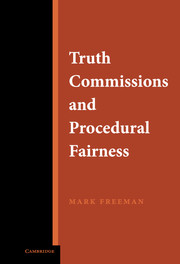Book contents
- Frontmatter
- Contents
- Foreword
- Preface
- Acknowledgments
- Abbreviations
- Part I
- Part II
- 3 Statement Taking
- 4 Subpoena Power
- 5 Search and Seizure Power
- 6 Public Hearings
- 7 Publication of Findings of Individual Responsibility
- Summary of Recommendations
- Appendix 1 Table of Truth Commissions
- Appendix 2 Primary Materials on Truth Commissions
- Appendix 3 Primary Materials on Other Commissions of Inquiry
- Index
4 - Subpoena Power
Published online by Cambridge University Press: 27 October 2009
- Frontmatter
- Contents
- Foreword
- Preface
- Acknowledgments
- Abbreviations
- Part I
- Part II
- 3 Statement Taking
- 4 Subpoena Power
- 5 Search and Seizure Power
- 6 Public Hearings
- 7 Publication of Findings of Individual Responsibility
- Summary of Recommendations
- Appendix 1 Table of Truth Commissions
- Appendix 2 Primary Materials on Truth Commissions
- Appendix 3 Primary Materials on Other Commissions of Inquiry
- Index
Summary
Introduction
Broadly speaking, there are two kinds of subpoenas that are common to courts and some truth commissions: subpoenas ad testificandum (subpoenas to testify) and subpoenas duces tecum (subpoenas compelling production of documents and other objects that are material and relevant and in the custody or control of a person). References to the term “subpoena” in this chapter refer to both kinds of subpoenas.
If a truth commission is to have the ability to issue subpoenas, this must be specified in its terms of reference. In that respect, this chapter may be of particular relevance at the “design stage” of a commission, insofar as a commission cannot create its own subpoena power. Also, because a subpoena is a legal device found in all major legal systems, the design and exercise of a truth commission subpoena power will generally be guided and governed by the relevant standards and practices of the concerned state. Consequently, the chapter does not go into extensive detail regarding subpoena powers, but instead attempts to highlight some of the key fairness issues at stake.
Subpoenas can be useful in a number of situations. A person with relevant information or evidence may be unwilling to volunteer information or to comply with informal requests for it. Alternatively, a person may be willing to comply, but concerned about the possible consequences of disclosure in the absence of a binding subpoena.
- Type
- Chapter
- Information
- Truth Commissions and Procedural Fairness , pp. 188 - 204Publisher: Cambridge University PressPrint publication year: 2006



